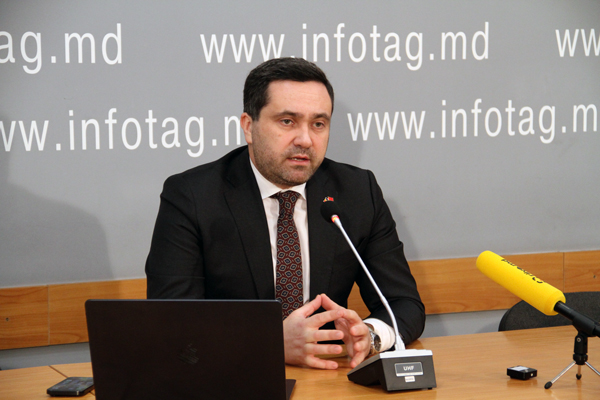Interview
JUDGES IN MOLDOVA HAVE BEEN DIVIDED INTO CLANS – LAWYER PAVLOVSCHI

On one of the first days of 2014, the Moldovan Judges Association, a civil society organization chaired by Ion Druta, demanded to punish ex-Judge of the European Court of Human Rights, currently a renowned local lawyer Stanislav Pavlovschi for tough saying about how corrupt judges in Moldova are. It is noteworthy that the Association unites such prominent members as incumbent Moldovan President Nicolae Timofti, Constitutional Court Chairman Alexandru Tanase and other celebrities, who agreed silently with the assertions by their colleague Druta. To let the other side of the dispute, lawyer Stanislav Pavlovschi, present his opinion, your Infotag correspondent Vladimir Popov asked him several questions.
Question: Mr. Pavlovschi, what do you think caused that statement by the Association Chairman, and how did it reconcile with the fact that not a single judge in Moldova was put to prison for corruption in recent years?
Answer: It’s a pity Mr. Druta demonstrated such a painful reaction. Being a judge of the Republic of Moldova’s Supreme Court of Justice, he should not forget the legal status all judges have. He should not have put his ambitions above the interests of justice, and should not have covered the corruption and non-professionalism of many judges with the prestige and public weight of the Association he heads. With his actions, he makes harm to the judiciary system as well as the young Moldovan State as a whole because he is encroaching on such democratic values as freedom of speech and lawyer’s independence guaranteed by the law.
What caused those actions? I don’t know for sure, so I can only presume that Ion Druta has simply scribbled his signature under a paper, which he was given to sign, without going deeply into it. Why do I think so? Because ‘his’ written address to the Prosecutor General’s Office contained data, which he couldn’t help knowing – the litigations I am running currently. But all this is only a technical side of the matter.
As for the matter proper, I can say the following. The question of what is of primary importance – lawyer’s freedom of speech or judge’s ambitions – is as old as Adam. I am not the first and surely not the last one here who criticizes the Moldovan judiciary system. Recently, this problem was considered by the European Court of Human Rights in the case of “Amihalachioaie vs. Moldova”. Moldovan Bar Union Chairman Gheorghe Amihalachioaie ventured critical remarks against the Moldovan Constitutional Court, which decided to punish him. I took part in that litigation as an ECHR Judge. The European Court discovered violation of Article 10 of the European Convention for the Protection of Human Rights and Fundamental Freedoms and recognized the Republic of Moldova as responsible for that violation. Apparently, Mr. Druta does not know very well the provisions of Article 10 and the ECHR practice of Moldovan cases, if he is stubbornly repeating one and the same mistake. I hope deeply that this example with Ion Druta is not a rule but an exception in the Moldovan judges community.
As for the absence of criminal cases against corrupt Moldovan judges, I have said so many times that any act of corruption is a very delicate, intimate event that happens invariably in deep secrecy, so it is very difficult to prove such criminal acts. I guess the most efficient method to combat corruption of the judiciary is through investigating material manifestations of a corruption act that are expressed in unlawful court decisions. What does this mean? Article 307 of the Moldovan Criminal Code stipulates criminal punishment of up to 7 years for passing a knowingly unjust verdict or judgment.
Criminal responsibility is stipulated also for unlawful detention, arrest or institution of criminal proceedings against persons. These very norms must be used first and foremost and fully in struggle against corruption.
Now an example from Moldovan practice. For many years, we had demanded that audio recoding be made at court sessions. At last, we have won, and such records are really made nowadays. And what? A new problem has emerged! Firstly, the written texts of session minutes often do not coincide with audio records. Secondly, when a lawyer demands a copy of minutes to draw up some documents needed for the defense, he is simply denied the document! Why? Because certain interests always stand behind practically every court judgment. I regard such instances as a manifestation of corruption, too.
Some time ago, I addressed to the Chisinau Appeals Chamber for a copy of minutes, but failed to receive it. So, I had to resort to all sorts of monkey business to get what I am supposed to receive automatically according to the law. Such manifestations of corruption and dishonesty must be an object of serious-most legal examinations, and relevant agencies must start this work without delay.
Q: You stated in a recent interview that Moldova needs to get rid of corrupt officials first. After that, with remaining civil servants, the republic should embark on the judiciary reform in earnest. You also said that to reform the Moldovan judiciary with corrupt judges and prosecutors remaining at their posts is but an illusion. Do you continue to insist that 80% judges and prosecutors must be fired?
A: Of course, I have never calculated concretely how many judges in Moldova are corrupt, or how many are weak professionals, or are boorish, or primitive career seekers or, upon the whole, how many of them deserve holding such sensitive positions.
Of course, the statement concerning 80% undeserving the judge’s gown was my personal evaluative opinion based on my own experience of a prosecutor, a judge and a defender. Working in the Strasbourg Court, I was a Rapporteur Judge in more than 1,000 cases. I have scrutinized several hundred decisions made by Moldovan judges. To say that those decisions did not hold water would mean to say nothing! Presently, working as a defender and communicating with other lawyers, I am coming to a conclusion that the problem has not disappeared – on the contrary, it has acquired a more monstrous, abnormal form. In very many instances, even the basic principles of a fair trial would not be observed in Moldovan courts.
On the other hand, availing myself of this interview opportunity, I would like to offer apologies to those honest, integral professionals who bear their judiciary cross with dignity, giving a hope for justice to people. May be, when they were reading Mr. Druta’s statement, they could get a wrong impression that I regard all judges in Moldova to be corrupt or amateurish. I swear this is not so, and I assure them of my profound respect for them. At the same time, I can’t agree with assertions that the problem of non-professionalism of many judges is a tabooed topic in Moldova or that it cannot be discussed here allegedly due to a threat of sanctions.
Question: Mr. Pavlovschi, what do you think Moldova should begin the judiciary system with, and which should be its first steps?
Answer: Reform in the sphere of justice does not differ in any particular way from reforms in any other sector. This is a usual crisis-management activity.
For the beginning, we must carry out an assessment of the situation and identify problems. How to do this? It is necessary to thoroughly study the complaints citizens lodge with courts, the Prosecution, the Supreme Magistracy Council, and with other agencies. Then we should outline the circle of problems citizens rise. Then we will need to organize opinion researches among court trial participants – lawyers, plaintiffs, defendants etc. We need to know the opinions of judges and prosecutors about how they are viewing available problems and possible ways to solve them. Also, we must scrutinize reports on Moldova prepared by various international organizations along with their recommendations, as well as the practice of the European Court of Human Rights on Moldova and other countries. In addition, we will have to carry out other methodological work to outline problems better.
After that, the outlined problems must be grouped by topic and by other criteria, and methods of resolving them have to be worked out. For this, we need to study other countries’ experience, attract highly qualified experts. It is important to hear the opinions of profiled non-governmental organizations and of parliamentary ombudspersons. Then, we will need to calculate financing for each segment of work, and elaborate indicators for work fulfillment checking, a monitoring mechanism and many other things.
One cannot say that nothing is being done in Moldova at all. But such work is being carried out insufficiently correctly, actively or efficiently. Many problems, which are of key importance for a high-quality of the judiciary reform, are being simply ignored or have been forgotten.
Q: How come an ordinary judge, having a monthly salary of some 8 thousand lei, lives in a luxurious mansion whose cadastre cost exceeds 2-3 million lei? And what do you think should the Integrity Commission and the law enforcement do in such a situation?
A: This is certainly not normal. Possession of such prestigious real estate is a sign of corrupt behavior and a ground for carrying out an in-depth check of whether or not the property has been obtained for legal income. The State ought to prohibit legislatively its civil servants to own property worth definitely more that the state official’s legal income. But there is no such legal prohibition in Moldova. I think the law should prohibit state employees to use real estate, cars, bank accounts and other values by proxy. And legal responsibility must be determined for such violations. The country should introduce a higher taxation on unproven-origin property costing definitely much higher than the owner’s official income. The rate of taxation on such property may be 70%, 80% and even 90% its worth.
The Moldovan state should scrutinize Hong Kong’s experience and practice in this sphere. In a matter of several years, that small state fully rooted out corruption, which had just flourished there before. That was achieved exactly by means of a merciless struggle against illicit enrichment.
Q: For a fourth year in succession, the All-Republican Assembly of Judges is being convoked with one and the same agenda: to elect 3 members to judges’ management bodies – the Supreme Magistracy Council. Why were the previous attempts invariably unsuccessful? Why do we see same applicants for the vacancies – Nichifor Corochii and Dina Rotarciuc, who have already been denied colleagues’ trust two times, and Ion Muruianu and Ion Druta, involved in corruption scandals?
A: I think there is only one reason to this: the judiciary corps in Moldova has been divided on a clan principle, and these clans have by now achieved a more or less stable parity. Of course, all this is very far from real independence of the judiciary system, and we can see – particularly through the prism of the Druta case – how green and immature the system is, and how much has to be done yet to create a perfect judiciary system.
Q: For what reasons does Moldova lose cases in the European Court of Human Rights?
A: It may sound paradoxical, but I think there is only one reason – violation of human rights in our country. But I am astonished not with this but with why Moldova loses so few cases. Apparently because the country’s strongest and most active jurists are involved in work, which they regard more important to them: Alexandru Tanase chairs the Moldovan Constitutional Court; Vlad Gribincea is reforming the Prosecution system, Vitalie Nagacevschi provides consultancy to oligarchs and so forth. Fortunately, we can now see the emergence of a whole constellation of young lawyers who, with time, will achieve a situation when human rights will really be respected and observed in this republic, and the words like human rights, democracy etc. will become a reality. I wish to all of us such time to come as soon as only possible.
Infotag: Thank you very much for your interview, Mr. Pavlovschi.
























Add Comment